Viewing search results for "North Carolina Sights and Sounds"
View All Posts
Here at the Digital Heritage Center, we’re able to scan or photograph almost all kinds of two dimensional items and even a goodly number of those in three dimensions. However, audiovisual materials are sent off site for digitization to a vendor and, as such, it’s a service we’ve only been able to offer annually. We just concluded our second round of audiovisual digitization and, like last year, our partners came forward with a wide variety of film and audio nominations. This is the second in a series of posts about the accepted nominations, with links to the items in the Sights and Sounds collection.
State Archives of North Carolina
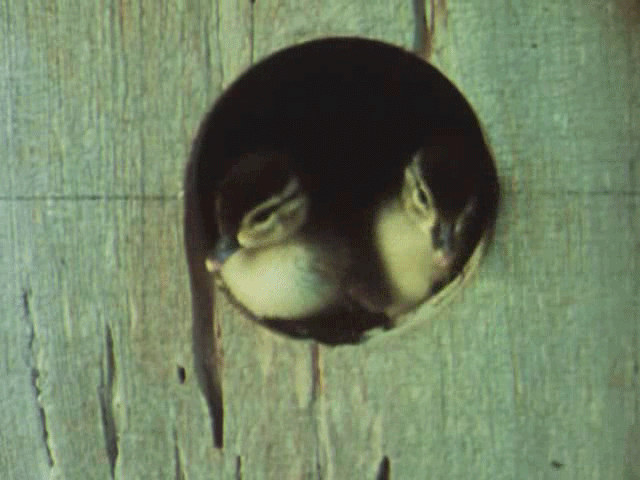
One of the best parts of “Wildlife Babies” is the footage of baby ducks jumping out of their bird house into a lake.
Appropriate for this election season, the State Archives has shared a number of short spots from the 1968 Governor’s race in which Robert W. Scott compares his policies and campaign tactics to those of his opponent, Jim Gardner. Scott’s criticisms of Gardner and his campaign echo some of what we hear today, and are also reflective of pressing issues in the state at the time, ranging from criticisms about Gardner’s attendance record to “misleading” campaign literature in which Scott was shown standing next to an African American man. There is also footage of a campaign speech made by Scott in Greenville, North Carolina, shortly before election day.
In addition to these are shared a number of films from the Wildlife Resources Commission. Many show both freshwater and saltwater fishing, both for sport and science. If you need your baby animal fix, you can check out “Wildlife Babies,” an award-winning feature that shows baby birds and mammals of North Carolina.
Mauney Memorial Library
We are always pleased to uncover and make available more films by H. Lee Waters, and during this round of digitization the Mauney Memorial Library came forward with two such films from Kings Mountain, N.C. These two most recent films are similar in style to the many produced by Waters, available both here and through an astounding collection at Duke University Libraries. There are many shots of school children walking in front of the camera, sometimes shy, sometimes silly. Some notable features include an aerial view of Kings Mountain, views inside local stores, and a product demonstration of a refrigerator (minute 26).
We’ll be posting several more blog posts in the coming weeks which will introduce the other films from our partners now viewable on DigitalNC.
Here at the Digital Heritage Center, we’re able to scan or photograph almost all kinds of two dimensional items and even a goodly number of those in three dimensions. However, audiovisual materials are sent off site for digitization to a vendor and, as such, it’s a service we’ve only been able to offer annually. We just concluded our second round of audiovisual digitization and, like last year, our partners came forward with a wide variety of film and audio nominations documenting North Carolina’s history. This is the first in a series of posts about the accepted nominations, with links to the items in the Sights and Sounds collection.
Belmont Abbey College
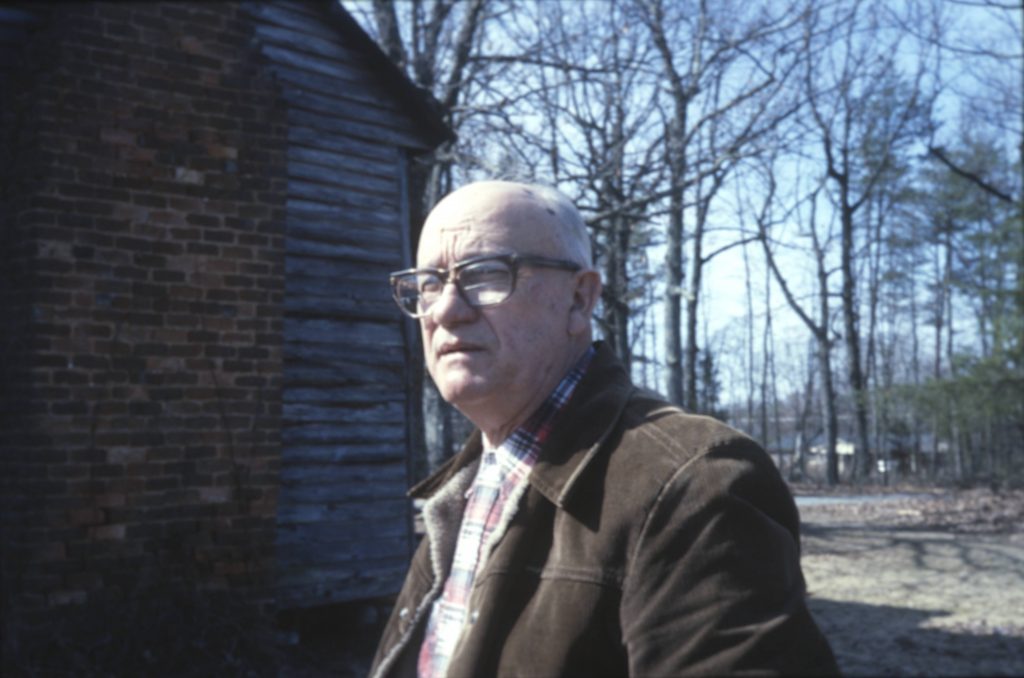
Unidentified man, presumably from Gaston County and interviewed for the Crafted with Pride Project in 1985.
The “Crafted with Pride” project, led by several cultural heritage institutions and businesses in Gaston County in 1985, sought to record and bring public awareness to the textile industry’s impact in Gaston County. During the project, a number of oral histories were collected from those who had worked in textile mills and lived in mill villages in towns like Belmont, Bessemer City, Cherryville, Dallas, Gastonia, High Shoals, McAdenville, Mount Holly, and Stanley. Belmont Abbey College has shared these oral histories on DigitalNC, as well as images and documents from the project. The oral histories touch on the toil of mill work, especially during the Great Depression, and the positive and negative cultural and social aspects of mill villages in North Carolina during the early 20th century.
Cumberland County Public Library
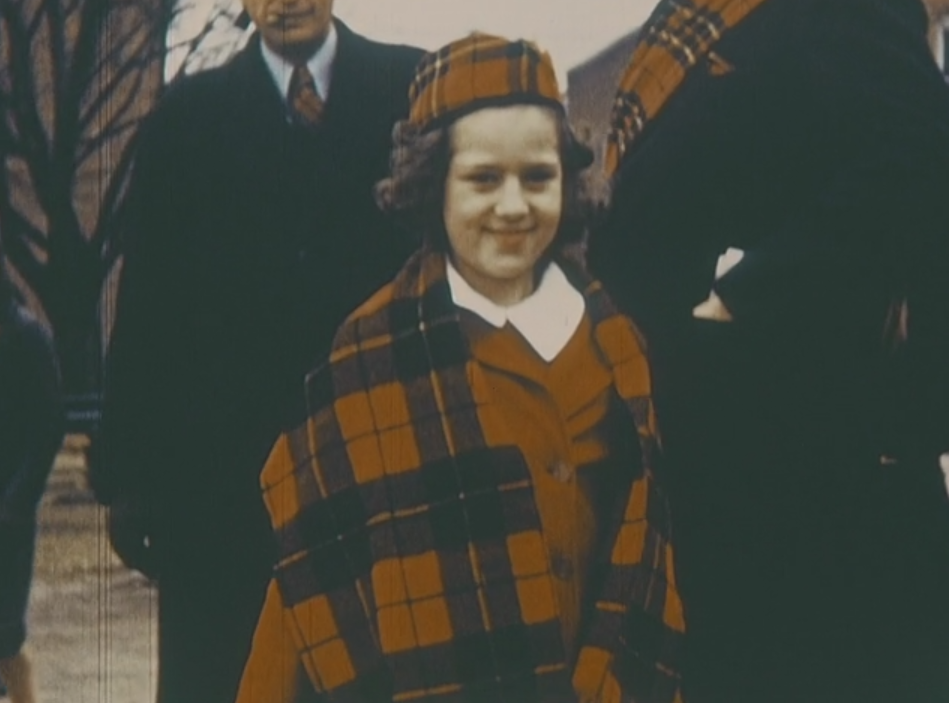
An unidentified girl wearing tartans at festivities surrounding Cumberland County’s Sesquicentennial in 1939.
Silent footage of the 1939 sesquicentennial parade in Fayetteville, N.C. combines Scottish customs, local history, and military displays from Cumberland County. This film was nominated by the Cumberland County Public Library, along with a brief advertisement soliciting support for renovation of Fayetteville’s Market House.
Duke University Medical Center Archives
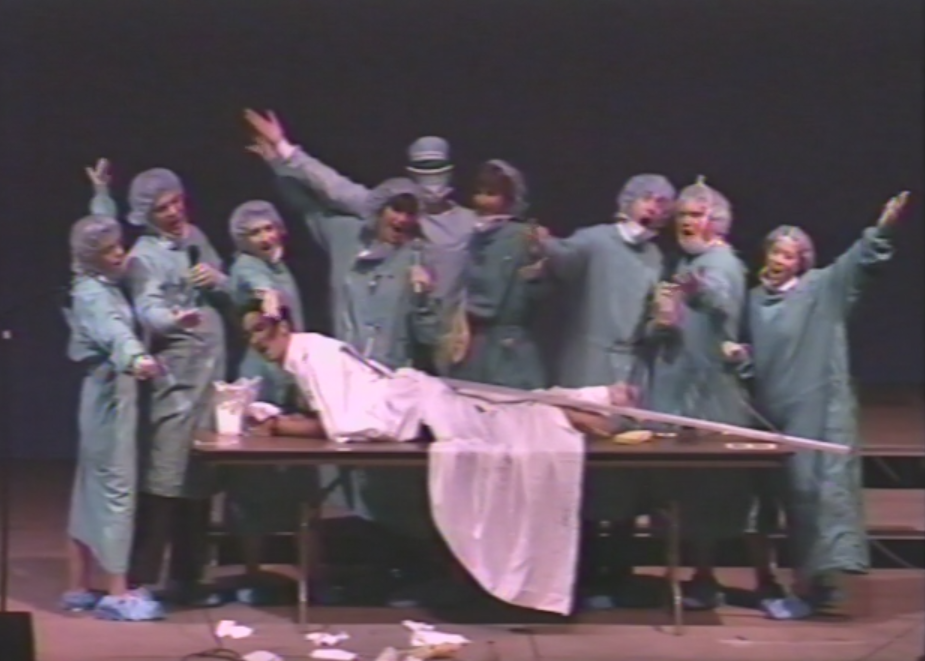
Scene from “The Sound of Mucus,” performed by Duke Medical School students in 1989.
The films and oral histories nominated by the Duke University Medical Center Archives describe the history of Duke Hospital and Duke University’s School of Medicine. Included is a Black History Month Lecture by Dr. Charles Johnson, the first Black professor at Duke Medicine, in which he describes his early life and his work at Duke. You can also view “The Sound of Mucus,” a comedic musical created and performed by Duke Medical students and faculty in 1989. Two interviews conducted with Wilburt Cornell Davison and Jane Elchlepp give first hand accounts of Duke Hospital and Medical School history.
We’ll be posting several more blog posts in the coming weeks which will introduce the other films from our partners now viewable on DigitalNC.
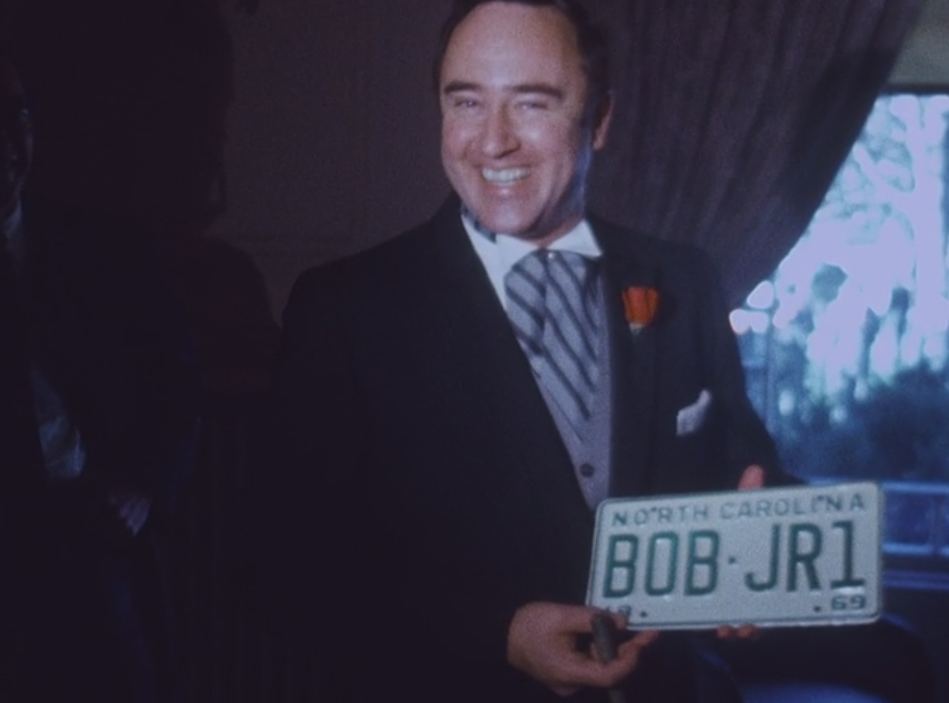
Governor Robert W. Scott receives a “Bob Jr.” license plate in this footage of his inauguration and subsequent celebrations. Contributed by the State Archives of North Carolina.
Almost one year ago, we asked our partners for nominations of audio and video media from their collections to digitize, using funding from the Digital Public Library of America. From all corners of North Carolina came suggestions for moving images and sound. Some items were well documented, with descriptions or finding aids [?] in tow. Others were accompanied with the words “We think this is … but we really have no idea.” Thanks to George Blood, L. P., who digitized these items for us, and Andrea Green, our former Community Digitization Manager, we ended up with over 140 physical items digitized from 11 institutions.
Here’s an overview of what’s been added to DigitalNC to our new Sights and Sounds collection (some of our partners will be posting their digitized media on their own digital collection sites instead). Stay tuned over the next few weeks for more posts taking a closer look at some of our favorites.
Braswell Memorial Library
Throughout the 1990s, Mary Lewis Deans spearheaded an ambitious and well-documented oral history campaign in Nash County. She and her colleagues spoke with long-time residents about rural farming life, military service during World War II, segregation, and family traditions. Deans was businesslike yet friendly, no-nonsense and yet genuine. Listen to and read Deans’ oral histories.
Charlotte Mecklenburg Library
Three of the films contributed by Charlotte Mecklenburg Library help document the history of Charlotte. The Charlotte Mecklenburg United Appeal campaign from 1952 shows numerous Charlotte places.
Davie County Public Library
From Davie County Public Library comes a two-part series on Davie County History, and a home video of local personality Louise Graham Stroud, who performed monologues as her self-created character, “Miss Lizzie.”
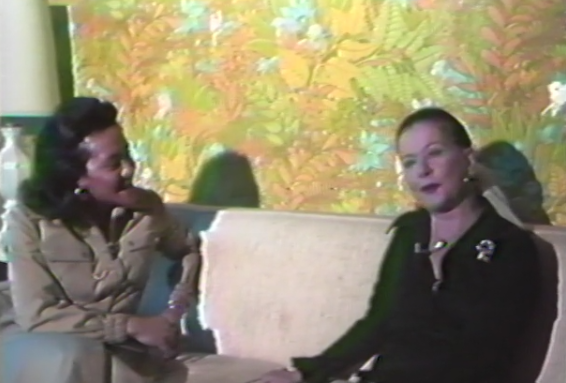
Cynthia Watts (left) interviews actress Joan Bennett in one of the Arts in Durham films contributed by the Durham Public Library.
Durham Public Library
Love Durham? Love the Arts? Love the late 70s? Some of our staff favorites come from Durham Public Library’s collection of “Arts in Durham” films. Produced by the Durham Arts Council, these films showcase local bands, dance groups, visual artists, and more. We’ll definitely be blogging about our favorite moments. Durham Public Library also contributed a taped lecture by Dr. Charles Watts on the history of Lincoln Hospital, and two-part coverage of the Durham County Centennial Parade of 1981.
Edgecombe Memorial Library
Tobacco Perspectives is an amateur recording of a two-night event in the early 1980s during which a historian, a political scientist, and representatives from farm, industry, and public health agencies lectured on the tobacco industry both past and present.
Rockingham County Public Library
We’ve already announced the bookmobile film from Rockingham County, but we’re still looking for someone who can identify the school that’s shown. In this film boys and girls eagerly peruse and check out books from local librarians. It’s even got Jim, the library dog.
State Archives of North Carolina
We were pleased to join for the first time with the State Archives during this project, as they chose a number of films that document the state’s history. Among the films from the Archives that we’ve added online are coverage of Governor R. W. Scott II’s inauguration and U. S. Coast Guard Appreciation Day (1970).
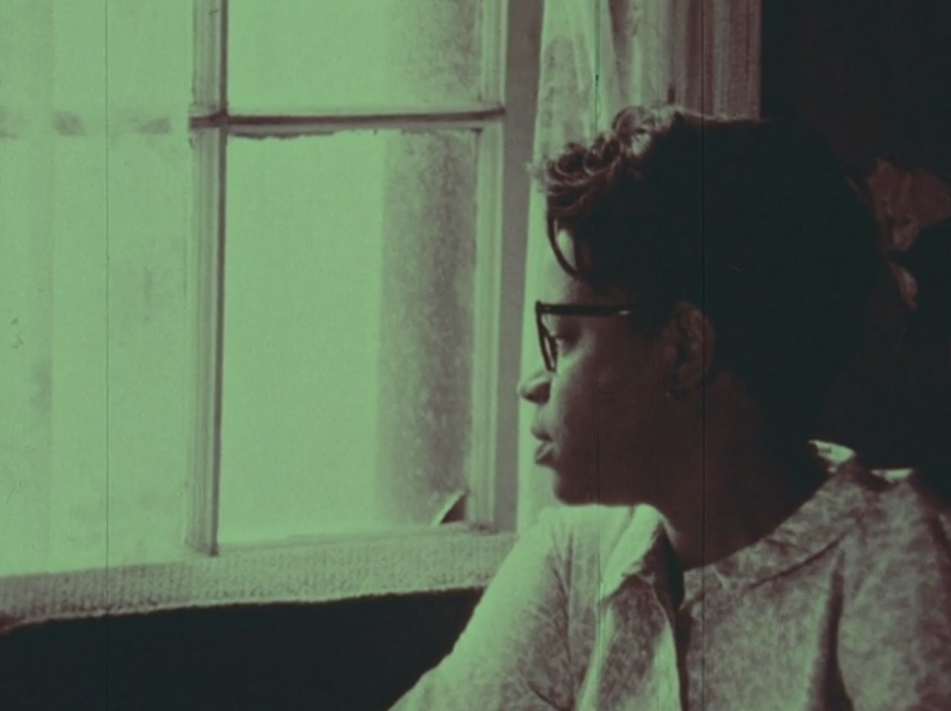
No Handouts for Mrs. Hedgepeth, 1968, documented a Durham family living below the poverty line. Contributed by the North Carolina Collection, UNC-Chapel Hill.
University of North Carolina at Chapel Hill
From 1962-1965, the North Carolina Film Board produced films tackling some of the most pressing issues in North Carolina: race relations, education, and economic opportunity. Eight of those films join others from the North Carolina Collection and Southern Historical Collection at UNC-Chapel Hill on DigitalNC. As might be expected, some are about UNC and Chapel Hill. Fans of the Hugh Morton Collection will also see several films believed to have been filmed by Morton or his colleagues. There’s even footage of Mildred the Bear.
University of North Carolina at Charlotte
In 1960, Dr. Bertha Maxwell-Roddey became the first chair of what is now the Department of Africana Studies at UNC-Charlotte, which contributed three items related to her career. A scholar, educator, and community icon, one of these shows children in a classroom being taught by Maxwell-Roddey’s students. The others show a night of live poetry and music.
We hope you enjoy North Carolina’s Sights and Sounds. Click to view all of the films and oral histories together.
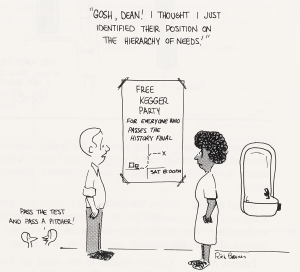
A cartoon referring to Maslow’s hierarchy of needs (from Analyzing the Learner’s Motivational Problems)
As a follow up to a series of audio tapes that we recently digitized, we’ve added a batch of several booklets of instructional materials for community college leaders from our partner, Randolph Community College. The materials are primarily authored by George A. Baker, one of the lead researchers for the community college leadership study recorded on the tapes.
The materials range from 1985 to 2001 and cover several resources for engaging students, addressing motivations, and setting goals. One collection of papers also includes student feedback about several education courses that Baker taught.
The full batch of materials is available here. To see more materials from Randolph Community College, you can visit their website and their partner page.
Thanks to our partner Randolph Community College, we’ve uploaded audio tapes of 62 interviews and discussions that informed the work Cultural Leadership Inside America’s Community Colleges by George Baker and contributors. Each interview asks an outstanding community college president or leader a series of questions about their leadership style and their vision for the future of their institution.
The large collection of tapes from interviewees around the country offers a great opportunity for teaching with primary sources; here are three ideas for how these materials could be used.
1. Journalism: What makes a good interviewer?
Although the interviewers in these tapes are rarely identified by name, their interviewing styles vary. Having a team of researchers ask the same set of questions makes it easier to identify some of the strategies that each person uses to engage their subject. Here are a few examples:
2. Representation & Gender
According to the American Association for Women in Community Colleges, close to 30% of community college presidents in 2020 were women. At the time of the recorded study, the researchers note that the proportion of women was closer to 7% (according to Baker and Rouche on tape 2). The majority of these tapes features interviews with male-identifying subjects; only four of the 50 community college presidents recognized for their leadership were women (thought other women in leadership positions at Miami-Dade CC were interviewed as well).
How do women’s answers differ from men’s in these recordings (or do they)? How do they approach the topic of representation in this setting?
3. History of Higher Education
In each of these recordings, community college leaders reveal some of the strategies that they use to attract and retain students, serve their populations well, and prepare their institutions for the future. Since this study’s findings were published in 1992, community colleges have had to adapt and reflect even more. What has changed in community college leadership over the past 30 years? How have schools shifted their approaches to serving students?
For comparison, it might be useful to check out our collections of N.C. community college handbooks and catalogs, which you can filter by school name and year.
You can see the full batch of audio recordings here. To see more materials from Randolph Community College, you can visit their partner page or their website. Even more audio materials are available in our North Carolina Sights and Sounds collection.
Thanks to our partner, Mars Hill University, over 40 audio recordings which discuss the history of the Appalachia region and old-time music are now available on our website. These recordings include oral histories with singers and musicians such as Dellie Norton; solo and group performances from the Lunsford Festival as well as the Mountain Dance and Folk Festivals in the 1960s and 1970s; jam sessions; and a university talk about the history of old-time music from the Appalachia region.
To learn more about Mars Hill University, visit their website.
To listen to more oral histories and audio recordings, please visit our North Carolina Sights and Sounds Collection.

Thanks to our new partner, Martin Community College (MCC), a North Carolina audio series focused on the history of Martin County and videos showcasing Martin Community College are now available on our website. The recordings detail the history of Martin County beginning all the way from the Upper Paleolithic (~50,000 to 12,000 years ago) to the 1980s. Included in the chronicling of the county’s history is information on early burial practices in northeastern North Carolina (including humans and dogs), hunting practices, Indigenous culture, colonization of the area, agricultural economy of the region, transportation, and much more.
Videos in this batch feature a look at the MCC campus in the 1990s and provide information about the various programs offered by the college at the time. These programs included basic skills, equine management, and medical assisting. The remaining videos highlight the exciting MCC Stampede in the Park rodeo event. This event, which continues to be held annually, raises money for Martin Community College student scholarships.
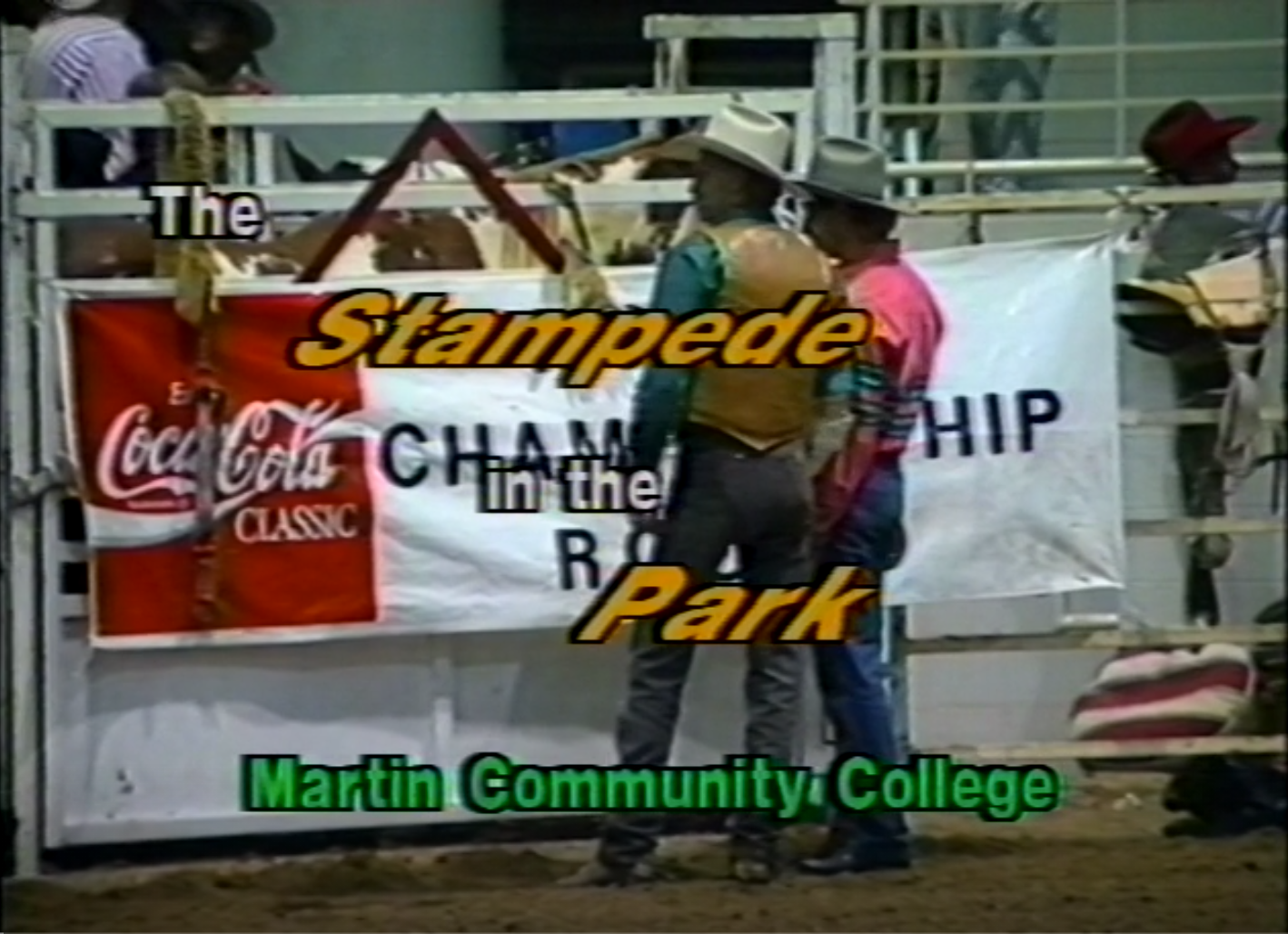
Stampede in the Park, Rodeo, 1992
Martin Community College is located in Williamston, North Carolina and was established in 1968 as Martin Technical Institute. On June 26, 1975, the college was granted community college status by North Carolina’s General Assembly. The MCC library serves not only the faculty, staff, and students of the college, but the citizens of Martin, Washington, and Bertie counties. Their local history room features books on the history of Martin as well as other surrounding counties, North Carolina history, narratives and photographs of historic buildings, and the Easter Rogerson Mizell Family Genealogy Collection.
To learn more about Martin Community College, please visit their website.
To listen or view more of North Carolina’s sights and sounds, please click here.
42 audio recordings, including 35 oral histories, and 1 silent video showing Methodist University (then College) in the late 1970s or early 1980s are now online. Thanks to our colleagues in the Southern Folklife Collection, these audiovisual materials were digitized utilizing funding from the Andrew W. Mellon Foundation.
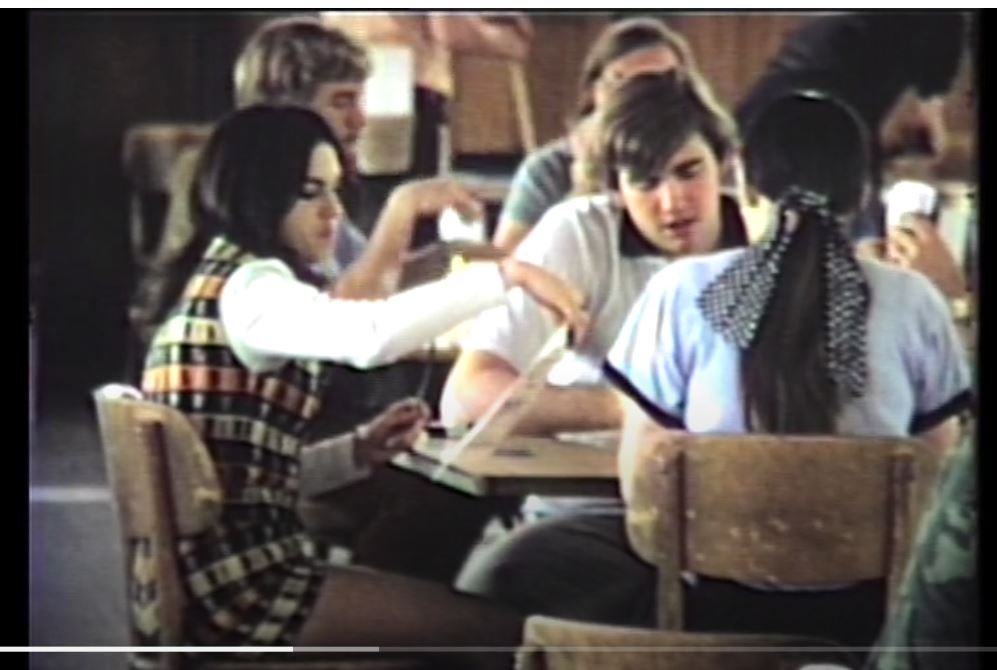
Video still from a silent video taken on Methodist University’s campus in the late 1970s or early 1980s
The oral histories including the batch are with various faculty and other staff who worked in the early days of Methodist University’s history. There are also 9 other audio recordings that include building dedications as well as fun items such as promotions that ran on the radio for theater productions at the school and a feature called Methodist College Report.
To learn more about our partner Methodist University, visit their site here. To learn more about our partnership with the Southern Folklife Collection, read this post. And to view and hear more audiovisual materials on DigitalNC, visit our North Carolina Sights and Sounds collection.
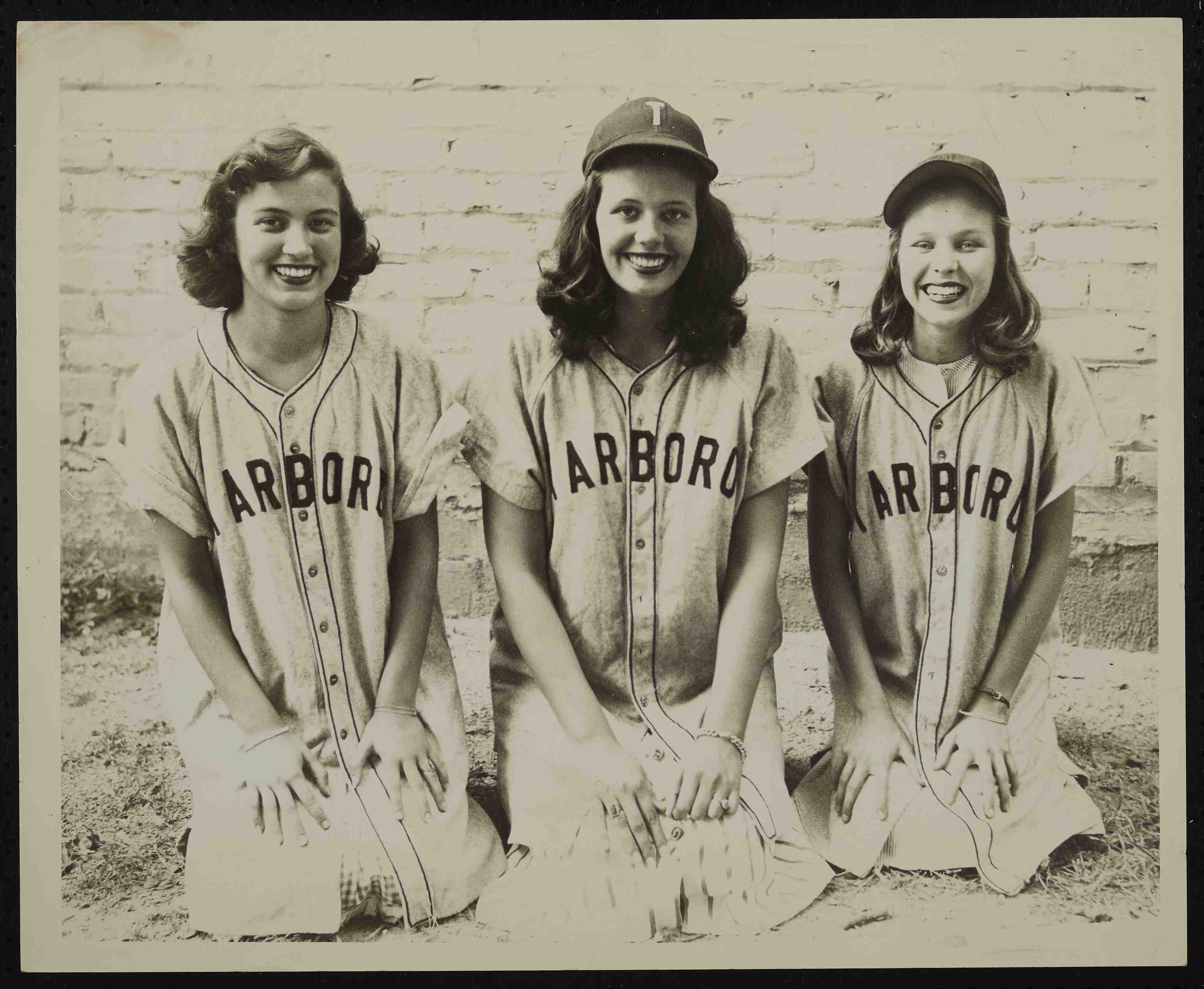
M.S. Brown: Miscellaneous Baseball Photos, Image 87
Regular followers of DigitalNC are likely familiar with M.S. Brown and the growing collection of photographs he took around Edgecombe County available on the site. Another batch is now available online, courtesy of our partner, Edgecombe County Memorial Library.
This batch features additions to the pageants, boy scouts, and basketball objects and several new objects including auto wrecks, baseball, and children. One object that some might find interesting contains photos published in the “Home Front News.” Members of the Oxford community published this local newspaper during WWII and shipped it local men serving around the country and abroad. It often featured single women in the area that were interested in writing letters to
soldiers. The set includes many of the proofs that M.S. Brown shot for the paper.
Also completed in this batch are several documents and publications relating to the “Tobacco Perspectives” project. The project consisted of an exhibition of tobacco memorabilia and a series of public forums examining the role of tobacco in Edgecombe County’s economy. Organizers hoped to inspire community discussion about the crop’s harmful effects and the county’s dependency on its growth. DigitalNC is also host to several videos of the discussions.
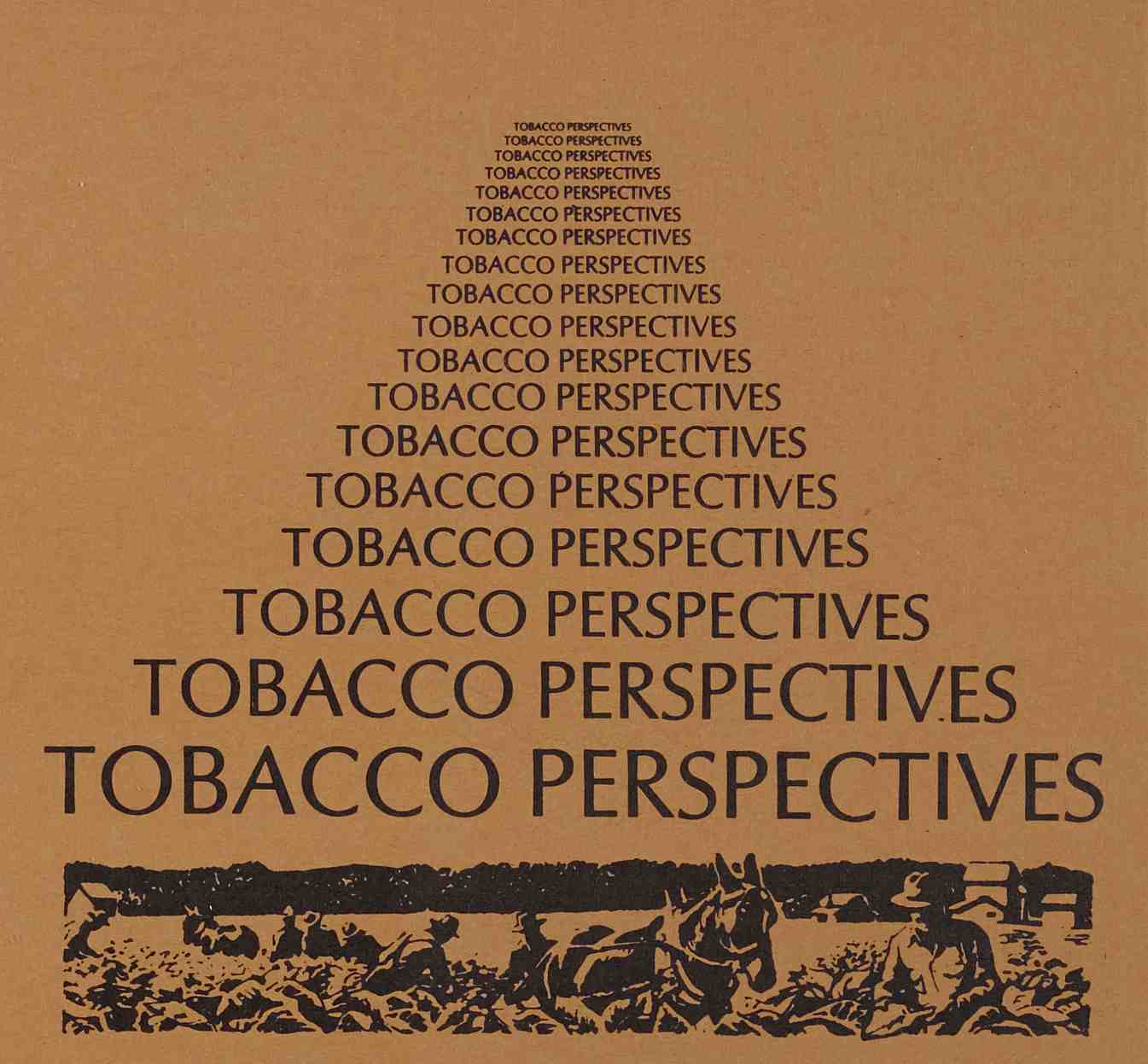
Tobacco Perspectives Brochure
You can view the new materials relating to “Tobacco Perspectives” at the links below:
Items in this blog post come from the Images of North Carolina Collection and the North Carolina Memory Collection. Check them out for more items like these. To learn more about the Edgecombe County Memorial Library, please visit the contributor page or the website.
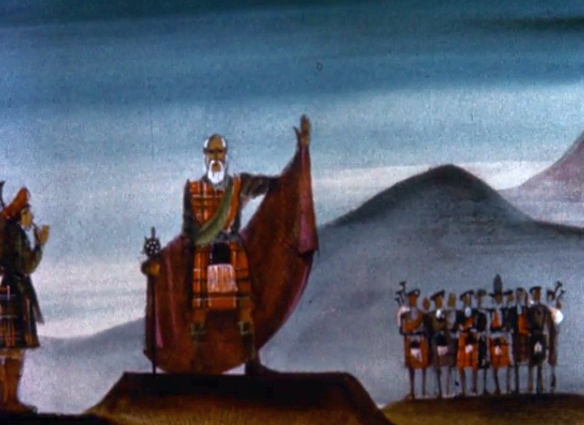
Film still from The Road to Carolina
In the early 1960s, North Carolina’s state government created a Film Board to “portray and illuminate the people, problems, themes, and life of the State” (Oettinger 1964/1965, p. 1). Championed by Governor Terry Sanford, the Board operated from 1962-1965 and created 19 films. As part of our recent audio-visual project, the Charlotte Mecklenburg Library and the North Carolina Collection at UNC-Chapel Hill’s Wilson Library contributed eight of these films for digitization.
During the Board’s operation, “ideas and requests for the films came from various state departments, individuals on the Governor’s staff or historical associations from around the state” (Ferrara 1981, p. 23). Production costs for each film averaged $30,000. James Beveridge, a filmmaker from Canada, was brought in to head the Board. (The State Archives has shared film clips from Beveridge online as well.)
The Board aimed to produce films that were documentary in nature, looking at different industries, locations, or segments of the population. Some addressed politically charged issues; the Minority Report series is a stark exploration of race relations. “Goodbye to Carolina,” was coordinated with the help of the Intercollegiate Council for Human Rights, chaired by then A&T student Jesse Jackson.
Below is a list of the films produced by the Board that are currently available on DigitalNC*:
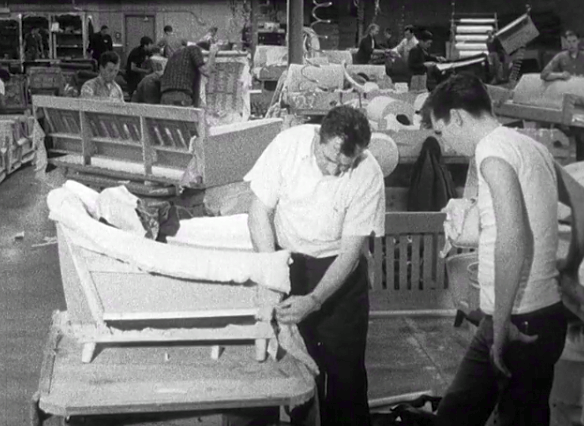
Film still from Welcome to Work
- The Ayes Have It (1963) A behind-the-scenes look at the North Carolina General Assembly.
- Minority Report: A Series Stating the Opinions and Experiences of Negro Students in North Carolina
- Goodbye to Carolina (1964) Interviews with North Carolina A&T College (now University) about their reasons for seeking jobs outside of North Carolina.
- A Knocking at the Gate (1964) Interviews with North Carolina College (now North Carolina Central University) students about civil rights.
- North Carolina’s Tribute to President John F. Kennedy (1964) Covers the memorial ceremonies for the late President held at UNC-Chapel Hill.
- The Road to Carolina (1963) Commissioned by the NC Tercentenary Commission and created for eight graders, this illustrated film recounts the first hundred years of the state’s colonial history.
- The Search for Excellence (1965) Follows rural residents’ experiences as communities around the state were consolidating educational resources and schools to a centralized model.
- The Vanishing Frontier (1963) The state’s Appalachian communities are documented through first-hand accounts with citizens, revealing the area’s “poverty and promise” (Ferrara, p. 28).
- Welcome to Work: The Siler City Story (1964) Describes the changes in Siler City as it transitioned from an agricultural-based to an industrial-based economy.
- Updated March 21, 2019
It’s interesting to see the film topics chosen during this time period. Instead of shying away from hot button issues or glossing over the widespread demographic, economic, and social changes of the era, the Film Board tackled them with a freer hand than might be expected. Such ambitious and frank efforts eventually contributed to the Board’s dissolution.
You can view additional items on DigitalNC from the Charlotte Mecklenburg Library and the University of North Carolina at Chapel Hill.
Notes
*The other films are: Land of Beginnings; Minority Report: Vote and the Choice is Yours; Minority Report: We’re Not Alone; Nine Months To Go; The Outer Banks (possibly lost, according to Ferrara)
References
Ferrara, Susan E. “The Demise of the North Carolina Film Board: Public Policy Implications.” M.A. thesis., University of North Carolina at Chapel Hill, 1981.
Oettinger, Elmer. “The North Carolina Film Board: A Unique Program in Documentary and Educational Film Making.” The Journal of the Society of Cinematologists 4/5 (1964/1965): p. 55-65.
















